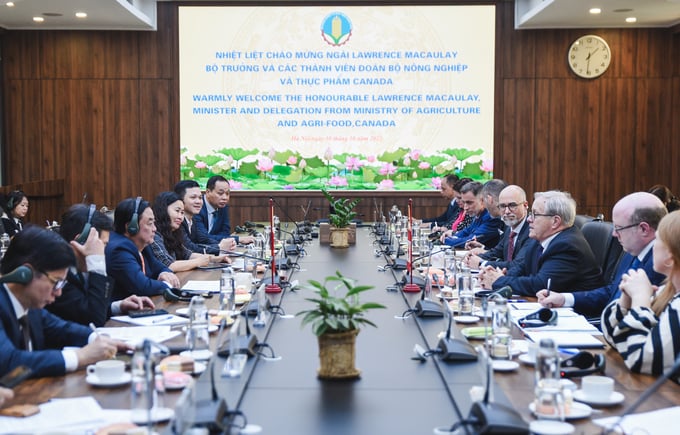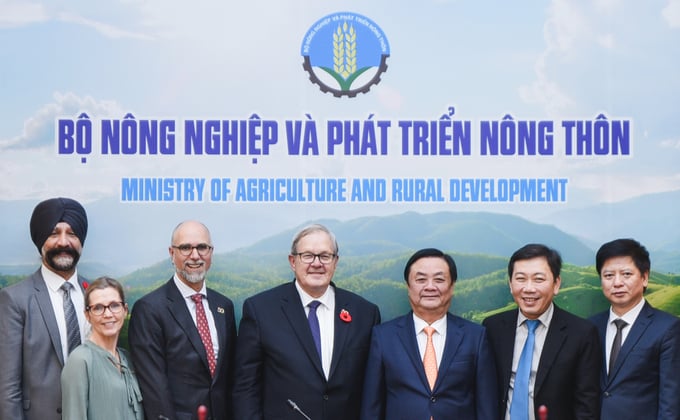May 21, 2025 | 03:08 GMT +7
May 21, 2025 | 03:08 GMT +7
Hotline: 0913.378.918
May 21, 2025 | 03:08 GMT +7
Hotline: 0913.378.918

Minister Le Minh Hoan received the Minister of Agriculture and Agri-Food in Canada on October 30. Photo: Quynh Chi.
On October 30, MARD worked with the Canadian Ministry of Agriculture and Agri-Food to promote bilateral agricultural trade. Minister Le Minh Hoan thanked the Canadian delegation for traveling all the way to Vietnam and meeting MARD leaders. Especially, as the two countries are celebrating 50 years of diplomatic relations, Minister Lawrence MacAulay’s visit affirms the role of agriculture in bilateral cooperation.
In recent years, Vietnam and Canada have focused on cooperation in agriculture, contributing to world food security and ensuring the food supply chain. The Canadian government has sponsored the projects Food Safety for Development and Smart Coastal Community Adapting to Climate Change in Vietnam, contributing to the development of safe and sustainable agricultural production. In addition, Canada’s Indo-Pacific strategy opens up opportunities for Vietnam to restore the agricultural supply chain, improve biodiversity, and develop sustainable, circular agriculture.
The Comprehensive and Progressive Agreement for Trans-Pacific Partnership (CPTPP) officially took effect in 2019 and has since promoted Vietnam - Canada agricultural trade. Specifically, agricultural export turnover between the two countries increased from 623 million USD (2017) to more than 1 billion USD (2023).
Vietnamese agricultural products such as seafood, vegetables, cashew nuts, coffee, and pepper appear in many supermarkets in Canada. Currently, Vietnam is Canada’s largest trading partner in Southeast Asia. At the same time, Canadian snow crab, Alaska lobster, wheat, soybean, and beef products are popular with Vietnamese consumers. Canada also exports animal feed and fertilizer for Vietnam’s agricultural production.

Minister Lawrence MacAulay hopes that the Canadian and Vietnamese agricultural sectors will have long-term and strong cooperation. Photo: Quynh Chi.
Mr. MacAulay shared: “We appreciate the efforts of Vietnam’s agricultural sector - your country has contributed to ensuring food security in Canada. We want to learn more about the market mechanism for long-term investment in Vietnam’s agricultural industry. We are here to stay - we hope that Canadian businesses and scientists are not simply guests. We hope to stay for long and continue to support Vietnam in scientific research and technology transfer.”
Although trade between the two countries is growing well, Canada still has a large trade deficit of agricultural products from Vietnam. In order to balance the bilateral trade, agencies under MARD have decided to remove field thistle from the list of quarantine subjects (field thistle has a high invasive potential, causing harm to many types of plants, including soybeans and wheat).
Eliminating field thistle quarantine will help Canada export more flour products, beans, and animal feed ingredients to Vietnam. Statistics from the General Department of Vietnam Customs show that the value of Canadian wheat imports into Vietnam has increased significantly, from 10 million USD in 2022 to 60 million USD in the first nine months of 2023.

“Vietnam - Canada agricultural trade has an advantage. Our products complement each other, so we are not competitive,” Minister Le Minh Hoan affirmed.
“Vietnam - Canada agricultural trade has an advantage. Our products complement each other, so we are not competitive. Therefore, I believe that in the future, the import-export turnover between the two countries will continue to increase, and the people of the two countries will continue to enjoy each other’s agricultural products,” Minister Le Minh Hoan said.
To develop green and sustainable agriculture, MARD want to learn from Canada’s experience developing a carbon certificate market, reducing emissions, and digital transformation for the entire industry. At the same time, the Canadian Minister of Agriculture and Agri-Food visits to Vietnam will encourage Canadian businesses to invest and cooperate with domestic businesses, supporting Vietnam to become a clean agricultural product processing center in the region and the world.
Regarding the possibility of opening the market for seed potatoes and blueberries from Canada, the Plant Protection Department reported that they sent a working group to inspect cultivation and processing facilities. The Department has agreed on import conditions with Canada. Representatives of the Department of Animal Health also highly appreciated how Canada is preventing African swine fever and committed to supporting pork products imported from Canada.

Leaders of the two Ministries of Agriculture took commemorative photos. Photo: Quynh Chi.
The two Ministers of Agriculture pledged to strengthen cooperation on food safety, hoping agricultural trade will soon reach 10 billion USD as expected by the Prime Ministers of the two countries. Therefore, agricultural development will contribute to bringing the Comprehensive Partnership between the two countries to the next stage.
Translated by Quynh Chi

(VAN) In 2024, over 295 million people across 53 countries and territories faced acute hunger—an increase of almost 14 million people compared to 2023, while the number of people facing catastrophic levels of hunger reached a record high.

(VAN) World Environment Day 2025 (June 5) carries the theme 'Beat Plastic Pollution' continuing to emphasize the global urgency of addressing the plastic waste crisis.

(VAN) This was the assessment shared by experts at the workshop titled 'Assessing the Role and Potential of Low-Emission Rice Production Systems in Vietnam,' held on the morning of May 19.

(VAN) Cai Rong Port is the fisheries control center of Quang Ninh, helping to monitor fishing vessels, combat IUU fishing, and remove the EC's 'yellow card'.

(VAN) The German Agricultural Society (DLG) explores the possibility of establishing a mechanization service center in Vietnam’s Mekong Delta to support farmers in accessing and utilizing advanced machinery.

(VAN) On May 16, the Department of Water Resources Management, in collaboration with the Food and Agriculture Organization of the United Nations (FAO), held a signing ceremony for the GEF-8 project document.

(VAN) Food safety, mechanization, vocational training, and market opening are key areas of cooperation expected between the Vietnamese Government and the Federal Republic of Germany.